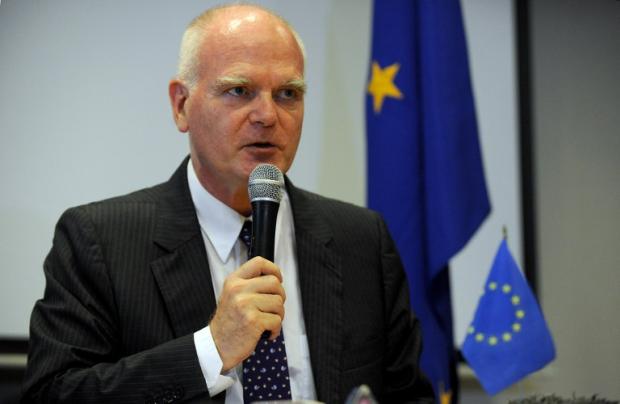EU envoy: 6-M Euro aid gone amid strain in EU-PH relations
The Philippine government has rejected a 6.1-million Euro (P382.8-million) project on trade assistance, EU Ambassador to the Philippines Franz Jessen confirmed on Wednesday, months after President Duterte’s stance to reject all aid money from the powerful bloc.
Three projects amounting to 39 million Euros (P2.4 billion) are about to be rejected, Jessen said, following criticisms from the EU and European parliamentarians of President Duterte’s bloody crackdown on illegal drugs.
Jessen said the Philippines canceled the 6.1-million fund allocated under the 300-million Euro Trade-Related and Technical Assistance (TRTA-4) Project Phase Four that should have been implemented in 2017.
“It was formalized in the sense that we have, for example, in the TRTA, a document that actually had to be signed by the end of the year. And that has been returned to us unsigned,” Jessen told reporters during the Kapihan sa Manila Bay news forum.
He said the 6.1-million fund had “disappeared” because the budget for the project was allocated in 2017.
Article continues after this advertisement“We’re now in 2018, we cannot spend 2017 money so that’s gone,” Jessen said.
Article continues after this advertisement“So for me it is a bit sad that after 30 years plus of development cooperation, we suddenly get into this situation. And the independence of Philippine foreign policy we are still struggling a bit to understand how we are interfering in that,” he added.
In October last year, President Duterte said the Philippines would no longer accept grants from the EU for allegedly disrespecting the country’s sovereignty following a group of European parliamentarians’ denouncement of human rights violations in the country.
“I’m cursing them [the EU] because they do not know how to respect sovereignty,” he said. “We need aid but if it’s like that, you are taught how to do it … that’s pedantry.”
READ: Duterte: PH will reject EU aid
Jessen said the other three projects about to be rejected, which separately amounts to 10 million, 11 million, and 18 million, all in Euros, were for the “provision of renewable energy to poor households [and other] different components.”
The Ambassador said the EU would decide within the week if one of the projects he mentioned would push through or be postponed.
“We have a third one which is a third call for sustainable energy that we have to decide this week to postpone or not,” he said.
READ: PH spurns EU interference, rejects 250-M aid — official
But despite the Philippines’ decision to turn down the aid grant, Jessen said the EU respects the country’s decision, and the funds would go to other countries in need of them.
“We respect the decision. It is important for us that we don’t have misunderstanding. It’s, at the end of the day, for them to decide,” Jessen said.
Jessen maintained that human rights is one of the key areas the EU would engage the Philippines with. He said human rights are integral in the development of political and economic freedoms of societies.
